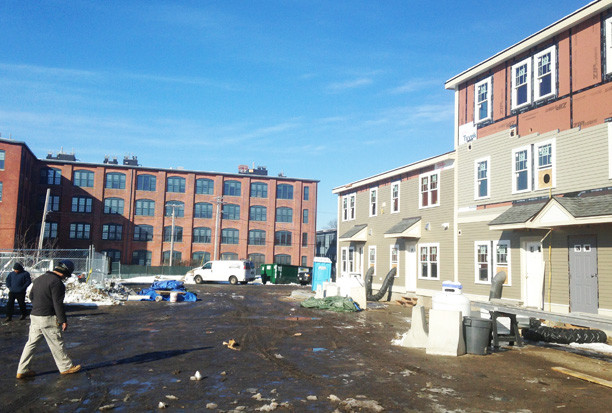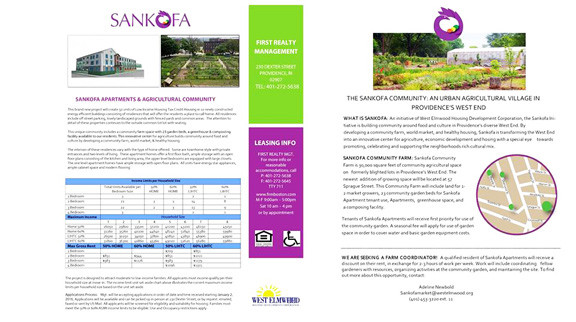Is there better way to make investments to bring prosperity to Rhode Island?
Or, why didn’t the team from the Brookings Institute find time to visit the Sankofa Initiative in the West End to learn how it has linked investments in neighborhoods, affordable housing and urban farming?
PROVIDENCE – When the Brookings Institute undertook its $1.4 million study to identify future avenues of economic growth that Rhode Island could pursue to achieve prosperity, it developed a series of recommendations based upon the analysis of traditional industry metrics developed by national consulting mainstays of Battelle Monitor and Deloitte to identify the opportunities.
The study, released on Jan. 19, pinpointed what it saw as the lack of recovery and job creation within Rhode Island’s advanced industry clusters in the aftermath of what is now known as The Great Recession.
[Of course, there was no discussion in the report of what had actually caused the Great Recession: it was not a housing bubble, but rather out-of-control Wall Street banks, insurance companies, brokerage firms and rating agencies, all of whom had been active partners in promoting and selling risky mortgages and then packaging them into unregulated credit default swaps as part of a money-making Ponzi scheme.
The bottom finally fell apart in 2008, requiring a huge bailout by Congress and the Federal Reserve and taxpayers. If you need a refresher history course of how the titans of unregulated private industry ran amuck and drove the nation’s economy to the break of collapse, go see the movie, “The Big Short.”
There was also no analysis of the additional vulnerability that Rhode Island had faced because it no longer possessed a local banking infrastructure that could intervene to provide ready access to credit and financing to its small businesses and homeowners, because most of its banks had been acquired by larger banks – many of whom were active participants in marketing those risky mortgages and swaps.]
The 198-page Brookings report identified seven industry clusters as the best potential targets for the state to make investments to create a steady flow of new, high-paying jobs.
Much of the analysis moved the needle from anecdotal to evidence-based findings: there were not any dominant industry clusters; rather, there was an interconnectedness between smaller industry clusters that could shape Rhode Island’s future strength in advanced industries, tied to its strong academic research base, its location in the megalopolis between Boston and New York, and its higher quality of life.
The report then included a detailed action plan – Rhode Island Innovates, Rhode Island Competes, and Rhode Island Acts – laying out a roadmap for how to accomplish these new recommended initiatives.
Not surprisingly, the study has provided in large part the “infrastructure” for Gov. Gina Raimondo’s future economic development plans in her FY 2017 budget.
Challenging the hypothesis
The hypothesis of the study is that investments in attracting new advanced industry firms to locate in Rhode Island will create a new wave of job growth, and, in the words of the Governor, “spark an economic comeback.”
The underlying economic assumption is that attracting these new companies to locate in the Ocean State will be driven by different kinds of business and tax incentives, as well as changing the perception of Rhode Island as a good place to do business.
Further, the best way to create an inviting setting for those new companies is to create an indigenous talent hub within by investing in what’s known as STEAM education – science, technology, engineering, arts and math.
But the unasked – and unanswered – question, missing from the study’s methodology, is this: do investments in companies actually create wealth and prosperity, and for whom? [Or, as a parallel question, do investments in the health care delivery system actually improve health, wellness and prevention outcomes?]
Are there other, better collaborative approaches to rebuild Rhode Island’s economic base that, in the long run, will serve as an economic engine that creates a better return on investment? Good question.
At the heart of the Brookings’ argument is the belief that new public-private-civic partnerships that invest in industry will create a path to prosperity. A different tack would be to take same kind of collaborative, public-private-civic partnership model, and instead make those investments in neighborhoods, communities, and affordable housing – a successful model that already exists in Rhode Island, one that champions the state’s diversity.
It does not need to be a yes-or-no, either-or, are-you-for-it-or-against-it debate. But when the community-based approach is left out entirely of the proposed solution, it requires some pushback.
A neighborhood tour
The former Rau Fastener building was once an eyesore, the detritus abandoned from a previous industrial era, one of many similar brick factory buildings that had been abandoned by its owners, its fasteners a kind of forgotten product line that were once used to keep pants up.
As Angela Ankoma, chair of the West Elmwood Housing Development Corporation, described it to ConvergenceRI, “The building was a huge blight, an eyesore, a source of criminal activity and drug activity.”
Today, it is the centerpiece of an array of affordable housing projects, The Loft and The Commons, completely transforming the neighborhood. The developments now serve as the anchor to an expanded vision of the community, known as the Sankofa Community Initiative, a $13 million project.
“The Sankofa Community Initiative is a unique urban agricultural community, integrating food production and economic development with high-quality, stable affordable housing for the sizeable, diverse cultural and ethnic population of Providence,” Ankoma said.
The Initiative includes three components, Ankoma explained: Sankofa Housing, which consists of 50 units of affordable 2-bedroom, 3-bedroom, and 4-bedroom apartments, being built on a few city blocks in the West End; Sankofa Farm, on land surrounded by the new housing and set aside for community agricultural use; and Sankofa Market, an urban marketplace expanding community access to fresh, affordable appealing foods.
“The vision is that the Sankofa Community Market can serve as a social hub, where farmers and shoppers can build relationships with other community members, incubate small businesses, and access health information and other resources,” Ankoma said.
The leader in shepherding the Sankofa Community Initiative has been the West Elmwood Housing Development Corporation, a not-for-profit housing and community development agency, led by Sharon Conrad-Wells, the executive director.
Ankoma praised Conrad-Wells for her tenacious advocacy in pushing for the urban farming component as part of the Sankofa affordable housing development. The funding partners included Neighborworks America, Rhode Island Housing, Boston Financial Investment and RI LISC
The Sankofa Community Initiative has attracted both national and international attention for its innovative work, with West Elmwood Housing being invited to share its insights in places as far away as Arizona and Italy. [But somehow, for whatever reason, it did not appear on the radar screen of The Brookings Institute study or CommerceRI.]
Cultural mecca
Ankoma called the West End “the cultural mecca” of Providence, where ethnic communities intersect and interact and bump up against each other on a daily basis in the neighborhood – a mix that includes residents whose heritage is Hmong, Cambodian, Ghanian, Nigerian, Dominican, Puerto Rican, and Colombian – as well as a host of Rhode Islanders whose immigrant roots go back further.
[In many ways, the community mirrors the model of an innovation hub that The Brookings Institute report highlights – about the collision of people and ideas in close proximity.]
“Diversity is a huge, positive economic factor for Providence,” Ankoma said. “If New York City can celebrate its celebrate its neighborhoods, why can’t Providence?”
Sadly, Ankoma continued, “Many don’t see cultural diversity as an asset.”
Corrective vision
If your only tool is a hammer, you tend to see all problems as a nail to be driven further in, or removed. It limits your vision and options, creating a kind of near sightedness, a silo that restricts how you see the world.
In people, when there is a recurring problem of near sightedness, eye docs call it progressive myopia.
Rhode Island, it seems, may have caught a case of progressive myopia: on one hand, there are the recommendations from The Brookings Institute study that call for sustained government investment in advanced industry clusters and companies to jumpstart the economy; on the other hand, right-wing, less-government proponents such as the R.I. Center for Freedom and Prosperity, which calls itself a “free-market think tank,” attack the Brookings Institute report as a new kind of tax-and-spend solution of big government.
[Steven Frias, a regular contributor to the editorial page of The Providence Journal, recently attempted to make the convoluted case that the anti-tax proponents in Massachusetts were the ones really responsible for the current Massachusetts economic growth spree. Frias conveniently managed to omit the key roles played by former Gov. Deval Patrick’s administration during its two terms from 2007-2015 as well as that of former Boston Mayor Tom Menino, in spurring the development of the state’s innovation ecosystem. Perhaps it’s time for an eye examination.]
Left out of the conversation, whether it is because of the sin of omission or commission, has been the successful platform of economic innovation that the Sankofa Community Initiative has launched in Providence, one that champions diversity and the integration of affordable housing and access to healthy, locally grown food. [Similarly, it was surprising to learn that the top consultant working for Brookings on defining the opportunities in the biomedical innovation industry sector had never heard of the 11 health equity zones in Rhode Island.]
The word Sankofa translates into the phrase: “Go out and get it.” Perhaps it’s time for Rhode Island’s economic development agency to learn a new, inclusive language moving forward.







